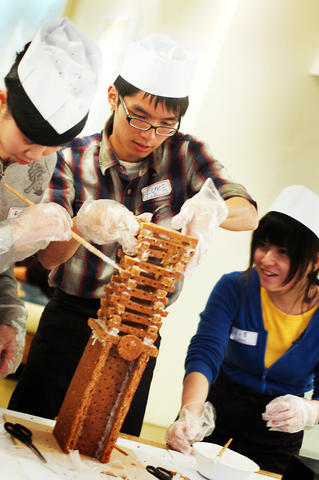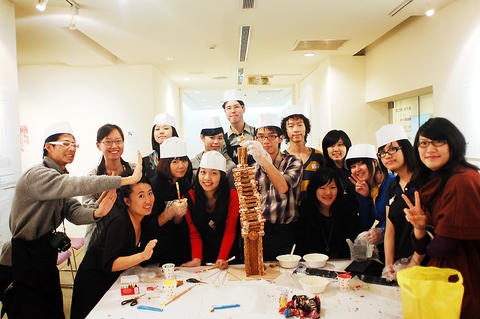Gingerbread nativity scenes are a staple of store windows come Christmas, but under the guiding hand of Post Theater, a multinational group of young artists who want to take theater, well, beyond theater, gingerbread has been transformed into the basis for a dialog about monumental structures and architectural symbols of identity. Of course, it also aims to provide some fun in the run-up to Christmas.
Monumental X'mas is the name of an event jointly organized by the German Cultural Center and the Taipei Artist Village (台北國際藝術村), who have invited the Berlin-based group Post Theater, made up of Max Schumacher and Hiroko Tanahashi, to lead a number of workshops to build Taiwanese and German monuments out of gingerbread. These have been built and put on display at the artist village through last week. The final display of the completed project, and its consumption, along with other Teutonic festive foods such as gluwine, will take place at the German Cultural Center tomorrow in a Christmas open house event that will also include a concert by the world music group NoMads and a concert of classical music by the Taipei Atmosphere Trio with soprano Lin Hsin-hsin (林欣欣) and pianist Su Kung-hsiu (蘇恭秀).
"We do see a lot of parallels in public monuments between Taipei and Berlin," Schumacher said in an interview Tuesday. "Both cities have experienced a history that is full of changes, of political regimes, of struggling for democracy, so we have found more parallels at hand that you might at first expect."

PHOTO: COURTESY OF TAIPEI ARTISTS VILLAGE
In addition to engaging in this dialog, the building of each monument will be recorded for editing into a stop-action animation also to be screened as part of tomorrow's event.
Schumacher said that Post Theater primarily focused on cutting edge multimedia performances and this was something of a holiday for them. "It (Monumental X'mas) is seasonal for one, it is Germanic, so relates to our headquarters in Berlin. My personal background culture as a German, but it is also very nice to reflect upon the edibility of non-edible things ... how you can eventually put something that is monumental into your own body."
The gingerbread is being provided by a local German bakery. On the first workshop last Monday comprising a group of design school students who were preparing to build a gingerbread version of Taipei 101, the huge slabs of spiced bread were being hurriedly blown dry prior to construction. Schumacher admitted that the load-bearing qualities of the bread had yet to be tested, but each of the buildings had been designed by architectural students who would preside over each construction project. The construction teams are drawn from members of the public, including students. The projects include the Berlin Television Tower, the Grand Hotel, the National Taiwan Democracy Memorial Hall (台灣民主紀念館) formerly known as the Chiang Kai-shek Memorial Hall, Berlin's Brandenburg Gate and more.

PHOTO: COURTESY OF TAIPEI ARTISTS VILLAGE
While the main purpose of the project is to promote a dialog and also have a little fun, there is also a more serious cultural agenda: "In Taiwan, Germany is regarded as one of the 'Christmas countries,' so the German Cultural Institute is interested in undermining certain cliches, so, yes, there are gingerbread houses, which are yes, a German tradition, but at the same time, the way it is dealt with is more contemporary and more cosmopolitan."

June 9 to June 15 A photo of two men riding trendy high-wheel Penny-Farthing bicycles past a Qing Dynasty gate aptly captures the essence of Taipei in 1897 — a newly colonized city on the cusp of great change. The Japanese began making significant modifications to the cityscape in 1899, tearing down Qing-era structures, widening boulevards and installing Western-style infrastructure and buildings. The photographer, Minosuke Imamura, only spent a year in Taiwan as a cartographer for the governor-general’s office, but he left behind a treasure trove of 130 images showing life at the onset of Japanese rule, spanning July 1897 to

In an interview posted online by United Daily News (UDN) on May 26, current Chinese Nationalist Party (KMT) Chairman Eric Chu (朱立倫) was asked about Taichung Mayor Lu Shiow-yen (盧秀燕) replacing him as party chair. Though not yet officially running, by the customs of Taiwan politics, Lu has been signalling she is both running for party chair and to be the party’s 2028 presidential candidate. She told an international media outlet that she was considering a run. She also gave a speech in Keelung on national priorities and foreign affairs. For details, see the May 23 edition of this column,

The Taiwan People’s Party (TPP) on May 18 held a rally in Taichung to mark the anniversary of President William Lai’s (賴清德) inauguration on May 20. The title of the rally could be loosely translated to “May 18 recall fraudulent goods” (518退貨ㄌㄨㄚˋ!). Unlike in English, where the terms are the same, “recall” (退貨) in this context refers to product recalls due to damaged, defective or fraudulent merchandise, not the political recalls (罷免) currently dominating the headlines. I attended the rally to determine if the impression was correct that the TPP under party Chairman Huang Kuo-Chang (黃國昌) had little of a

At Computex 2025, Nvidia CEO Jensen Huang (黃仁勳) urged the government to subsidize AI. “All schools in Taiwan must integrate AI into their curricula,” he declared. A few months earlier, he said, “If I were a student today, I’d immediately start using tools like ChatGPT, Gemini Pro and Grok to learn, write and accelerate my thinking.” Huang sees the AI-bullet train leaving the station. And as one of its drivers, he’s worried about youth not getting on board — bad for their careers, and bad for his workforce. As a semiconductor supply-chain powerhouse and AI hub wannabe, Taiwan is seeing